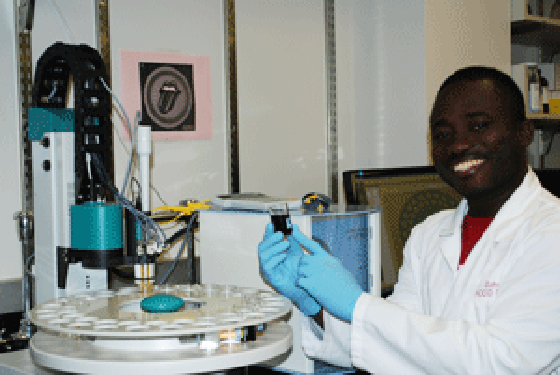A new “electronic tongue” at Washington State University is hard-wired to taste wines in a way that human tongues cannot. Unlike human taste buds, this so-called “e-tongue” never tires or takes a day off, even after hours of around-the-clock sampling, said Carolyn Ross, associate professor of food science and viticulture and enology, who runs the sensory evaluation lab on the Pullman campus.

Ph.D. student Charles Diako evaluates red wine using the e-tongue in the lab (Photo by Chelsea Pickett/WSU)
Ross is evaluating wines produced in the state of Washington, the second largest producer of premium wines in the United States. Working with Ross is her Ph.D. student, Charles Diako, originally from Ghana, who is a super-taster himself.
Diako appears to have met his match, though, working with the e-tongue to evaluate Washington wines.
While humans can detect flavor attributes, the e-tongue identifies taste compounds at the molecular level, said Ross. “The e-tongue gives an objective measurement of taste profiles and we try to correlate that to what happens in human sensory evaluation,” said Diako.
Automatic Wine Taster
The e-tongue works by dipping its “tongue” into a beaker filled with wine on a rotating platform called an autosampler. Then it reads a profile of sensory attributes ranging from metallic and savory to sweet and bitter. After the tongue recoils from the sample, the platform turns to present it with the next beaker of wine.
While human taste buds can get saturated and lose their keen ability to accurately distinguish taste features, the e-tongue never gets fatigued. But that doesn’t mean human taste testers and sommeliers will find themselves out of work. Many companies and institutions, including WSU, use tasters –some volunteer, some professional and paid—to sample products and provide feedback that fine-tunes the development process. “Human evaluation is more sensitive and integrates a huge amount of information and perceptions in response,” said Ross. “This new technology won’t replace human evaluation.”
For example, the e-tongue might be able to give some information about the mouthfeel of a wine, but it isn’t designed to do this, said Ross. A wine’s mouthfeel provides sensations of physical and chemical interactions among the human palate, often described in terms like tannic, aggressive or “chewy.”
And while the e-tongue interprets data by using biosensors and statistics, Diako uses his taste buds and brain. “The human tongue is the primary taste organ of the body,” said Diako. “Being a living tissue and being integrated with the most sophisticated computer the world has ever known — the brain — its perception of taste is absolutely matchless.”
Flesh-and-Blood Wine Taster
Just as fortuitous as pairing a good wine with the right cheese, the new e-tongue has been paired with the right scientist. Diako joined Ross’s lab a year ago, shortly after WSU purchased the e-tongue for its expanding role in Washington’s wine research. While there’s no way to know if the e-tongue enjoys its work, it’s clear that Diako loves what he does in the lab. Always smiling and often laughing, Diako knew little about wine or e-tongue technology when he came to WSU, he said.
“I didn’t even know there was a difference between Washington the state and Washington, D.C.,” he said, throwing his head back in laughter. But he does know sensory science and, now, what makes a good wine. Diako’s research history includes work on aromatic rice, an important staple food in his native African country. Diako plans on applying his expanded sensory skills to the research and higher education needs of his country upon returning home.
“I love research. I love teaching,” he added.
Diako is often sought out by lab members for his ingrained expertise at detecting precise tastes. Advanced taste sensitivity is often genetic and he was born with finely-tuned taste buds, he said. “You need that to be able to work in this field.”
Raising a Glass
The sensory lab is evaluating 60 red wines from Washington state, including a planned follow-up-study on the same number of Washington-produced white wines. “The use of the e-tongue for assessment of this many red wine samples hasn’t been undertaken before,” said Ross.
“The information gathered from the evaluations is important to the Washington grape growers and winemakers to guide fruit and wine flavor development,” said Diako. After all, a great bottle of wine begins in the vineyard. Will the e-tongue know if that bottle does contain, in fact, a good wine?
Absolutely, by providing it with a gold standard, affirms Diako, adding with a smile, “But it doesn’t know the price (of the wine).”
Learn more about WSU sensory science and research at http://sfs.wsu.edu/sensory/ or visit wine.wsu.edu. Written by Chelsea Pickett, Washington State University, reprinted from WSU’s Voice of the Vine newsletter
